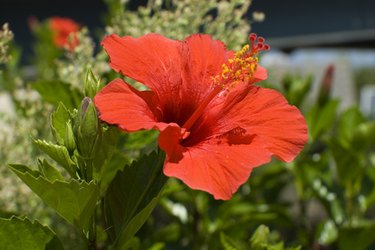
It's dismaying to discover a mass of ants crawling on your stunning hibiscus (Hibiscus rosa-sinensis) plants, but before you cringe and shake them off, consider what they are doing and how they benefit your plants. Hibiscus and ants have a mutually beneficial relationship – however, aphids and ants do not. The plant produces a sweet nectar in the base of the flower and that's what the destructive aphids crave. The ants are on the hunt for those aphids and their droppings once they've sipped that nectar. Ants feed on the aphids and the ingested honeydew. To rid the ants in hibiscus, you must attack the aphids first.
Controlling Aphids and Ants in Hibiscus
Video of the Day
Ants are one of the bugs that attack hibiscus plants; but actually, ants are attacking the aphids. The reasonable approach to ant eradication is to eliminate the aphids and then control the ants. This two-pronged approach to keeping your hibiscus blooming beautifully entails regularly monitoring for insect invaders, examining the petals of the hibiscus for black sooty mold, a byproduct of the aphids and their honeydew, and creating a barrier against the crawling bugs.
Video of the Day
A strong spray of water from the garden hose should dislodge many of the aphids. If any aphids remain, spray the entire plant, branches, leaves, flowers and trunk, with insecticidal soap or rosemary oil. Repeat the process in 14 days. A dose of imidacloprid, a systemic pesticide spread around the base of the plant, kills the aphids after ingestion, as well as the ants. Ant baits also work, as does wrapping the trunk of the plant with a sticky paper.
Understanding Ant Bait
Ants like to share. Especially if they've ingested a poisonous, sweet bait. The eat it, then carry it back to the nest where they die. The other ants eat the dead ant and they too die. If the poisoned ant dies on its way back to the nest, the other ants carry the body back to the nest and the cycle of destruction continues. It takes anywhere from two days to three weeks for the entire colony to be eliminated.
Alternate the bait with an insecticide and use different poisons. Don't let the insects build up an immunity to any poison.
Using Insecticides Wisely
When armed with an insecticide, remember that it is toxic, not just to insects but to humans as well. Natural treatments are best, but sometimes a strong application of a powerful chemical is needed. Wear a mask and gloves when applying.
Set your spray nozzle to the finest stream available. You want a thin stream that hits the insects directly. Go for the underside of the leaves as that's where the aphids hang out. The chemical must hit the aphids directly. The insecticide is effective only on the day you use it, so additional applications are probably necessary. Also, look for survivors, as they are still capable of causing damage to your hibiscus and attracting ants. Neem oil is recommended as a natural treatment.
Go to the source when ridding ants from your hibiscus. Look for the ant colony and pour hot water into it. Spraying them with orange seed spray also works if the bait doesn't. If you see a lizard or an iguana on your hibiscus, don't shoo it away. They are looking for a meal, and the ants supply it.